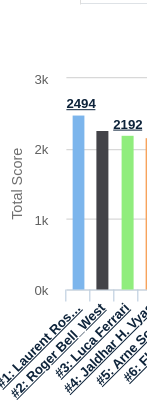How much did I do on The (Perl) Weekly Channelge?
I started the Perl Weekly Challenge (nowdays simply called The Weekly Challenge) back in the beginning of 2020. I started to do the challenge because I wanted to learn more Raku (aka Perl 6) and since, unluckily, I did not have any real chance to use it on my day-to-day job (and, sadly, I don’t have even today), that seemed to me a good way to stay up to date and learn the language. My initial commits were in Raku only. After a while, I decided to introduce also PL/Perl, the Perl-ish way of doing things in PostgreSQL. Therefore, I was staying up to date with my general Perl knowledge and also gaining more and more experience in solving problems within PostgreSQL. Clearly, I also added PL/PgSQL, the native procedural language of PostgreSQL to remain up to date with such language too. For a couple of years, I went with only those languages, and it was nice and an excellent way to learn more and more about everyone of the above. In recent days, a few months ago, I introduced also Python because I want to better learn this language. Last, a few weeks ago, I also introduced PL/Java because I don’t develop in Java anymore on a daily basis, and I want to keep my knowledge in good shape. But Java itself could be boring, so I decided to challenge me with the more difficult Java in PostgreSQL language (the difficulty is about the build and type-mapping). So, where am I today in the Perl Weekly Challenge?My PWC Numbers
With my surprise, I’m within the third place of the Team Leaders at the time of writing.

[App::Cloc](https://metacpan.org/dist/App-cloc/view/bin/cloc){:target="_blank"} results in the following report:
% cloc ~/git/fluca1978-coding-bits/PWC
752 text files.
750 unique files.
3 files ignored.
github.com/AlDanial/cloc v 1.76 T=1.06 s (708.8 files/s, 23104.4 lines/s)
-------------------------------------------------------------------------------
Language files blank comment code
-------------------------------------------------------------------------------
Perl 515 3439 2037 9918
SQL 198 1238 972 5603
Python 32 319 259 541
Java 3 21 21 41
Bourne Shell 1 2 0 5
-------------------------------------------------------------------------------
SUM: 749 5019 3289 16108
-------------------------------------------------------------------------------
therefore assuming 16 thousand lines of code and a grand total of more than 21 thousand of lines. The blog posts need to be added to these numbers to get the final result as counted by the Weekly Challenge.
Note that App::cloc does not recognize the .raku extension, as well as .plperl, so in order to make it happy, I temporary renamed files in the appropiate way.
How do I prepare for a Weekly Challenge?
After a few challenges, I created a shell script, that I namedpwc.sh that creates all the skeleton structure for me:
- it fetches the updates from the original repository;
- it creates the basic scripts for every language within my directory;
- it prepares the blog references for the challenge.
% pwc.sh create 253
and start coding. When I want to merge all the solutions within one of my GitHub repositories, I can simply do:
% pwc.sh sync
On the blogging side, I use a template within Emacs
YASnippet, alrteady set up for me to just be filled with the code and its explaination. If you follow my solutions, you will see that all the posts are pretty much the same, with the same title, order, structures, and so on.
It is interesting the way I create the skeletons of every source code solution: in the beginning I was using a shell here document approach, but nowdays I use Template::Toolkit and ttree to generate the stubs. I’m thinking to move over to tpage to have a better control and less repetitions among skeletons for the first and second task. Thanks to this, I can start coding in a very short time and with a very consistent environment.